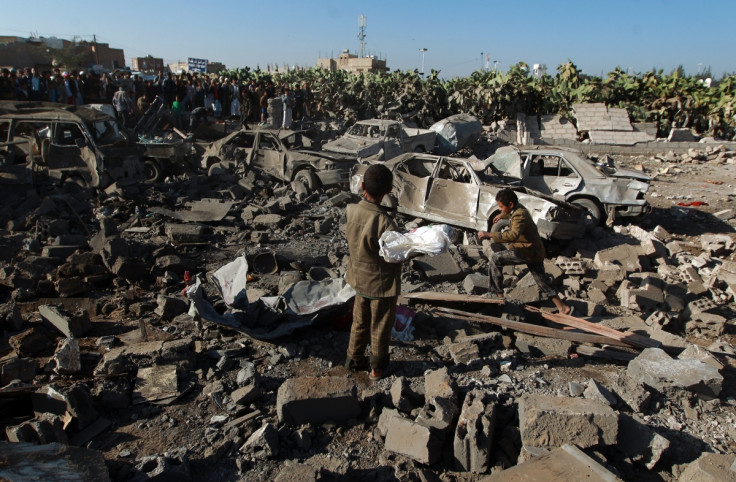Our arms exports business to Saudi Arabia is thriving at the expense of humanity

Arms dealers would have you believe that selling military equipment and expertise is good for the economy. Military companies are some of our biggest stocks worldwide. But I would suggest that this is a pretty narrow measurement on the whole. In the same way as crashing your car or getting divorced are good for GDP because they spur economic activity, they are rather less productive for society as a whole.
Similarly, when the weapons sloshing around the global market are actually used, all that precious GDP built up over the years is destroyed by men with the weapons we sold them. I do not think we should view arms exports as an economic asset. We should view them, entirely, within the preserve of foreign policy and morality. This may result in tightly limiting their circulation and so be it.
Nowhere is this more true than in the Middle East. Over the years the United Kingdom, France, Spain, Belgium and plenty more have made valuable profits out of selling warplanes, bombs and missiles to Saudi Arabia. Celebrated in government press releases, a gruesome competition has been under way between European capitals over who can flog the most.
We wonder why there are out of control wars abroad, spurring a refugee crisis that will, aside from the humanitarian misery, end up costing us an awful lot more than any arms company profits.
We do not know who sold more weapons amongst Europeans in 2015 – because many EU member states tend to publish the consolidated results of their arms sales consolidated many years after the bombs have been handed out - but we can be sure it is a huge deal. And for all member states with the honourable recent exception of Sweden, ethics, values and indeed historical considerations have been entirely absent. Then we wonder why there are out of control wars in our near abroad, spurring a refugee crisis that will, aside from the humanitarian misery, end up costing us an awful lot more than any arms company profits.

There is no question that EU arms sales to Saudi Arabia – by far the world's largest arms importer and the UK's top arms client – have aided and abetted gross breaches of international humanitarian law in Yemen. The sheer destruction of civilian infrastructure, including roads, schools, hospitals, water reservoirs and world heritage sites is almost incalculable.
Even more difficult to gauge still, what are the long term economic impacts of having 3.4 million children out of school in Yemen? Or destroying or closing 600 health facilities? Or, according to the latest UN figures, the deaths of 3,000 civilians including 700 children?
Aside from our contribution towards creating considerable suffering for our fellow people, there will be a financial cost to us also. Given the international community will, eventually, have to contribute to rebuilding Yemen, I would be curious to see a comparison of this cost to the public purse versus the private profits of the arms companies, even after factoring in the tax they pay.
There is no question that EU arms sales to Saudi Arabia - by far the world's largest arms importer and the UK's top arms client - have aided and abetted gross breaches of international humanitarian law in Yemen.
That is another reason why I am so pleased the European Parliament this week called for an EU-wide arms embargo on Saudi Arabia until we are assured that they will not be used in breach of international humanitarian law. A majority of MEPs from all 28 EU countries want to see the EU ask some tough questions, in public, of the policies of our member states, and the long term impact of those policies. Aside from the moral, ethical and logical consequences, I doubt the economics stack up.
Already, the impact of the Saudi intervention can be felt worldwide: the cost of on-board private security and insurance for shipping companies and other freight based businesses has spiked since March 2015, due to the 15% of the world's trade passing by Yemen's Gulf of Aden/Bab el Mandeb strait. The Balhaf LNG Terminal in Yemen has had to suspend its activity since April 2015, despite the very positive projections it had for the next twenty years when it first opened operations in 2005 – damaging for shareholders Total, Hunt Oil, Korea Gas and Hyundai and consumers as far afield as the US and South Korea. Many local Yemeni staff were fired in August 2015 because of the deteriorating security situation, exacerbating one of the few 'good news' stories coming out of Yemen's economy in recent years as well as continuing a cycle of poverty, violence and despair.
So long as we prioritise selling military equipment above wider economic and humanitarian considerations we will not see a full picture. We cannot be surprised that the Middle East is becoming more and more of a dangerous, unstable and costly place to do business in. I hope this week the European Parliament took a step towards making the world safer, for people and business alike.
Alyn Smith is a Scottish politician, and Scottish National Party Member of the European Parliament for Scotland.
© Copyright IBTimes 2025. All rights reserved.






















